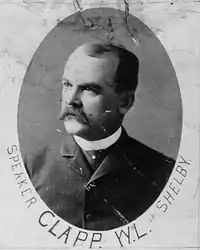W. L. Clapp
Walker Lucas Clapp (April 15, 1851 – September 29, 1901) was an American politician in the state of Tennessee.
W. Lucas Clapp | |
|---|---|
 | |
| Speaker of the Tennessee House of Representatives | |
| In office 1887–1891 | |
| Preceded by | James A. Manson |
| Succeeded by | Thomas R. Myers |
| Mayor of Memphis | |
| In office 1895–1898 | |
| Preceded by | William D. Bethell |
| Succeeded by | Joseph J. Williams |
| Personal details | |
| Born | April 15, 1851 Memphis, Tennessee |
| Died | September 28, 1901 (aged 50) Baltimore, Maryland |
| Political party | Democratic |
| Spouse(s) | Lamira Parker |
| Occupation | lawyer |
Early life
Walker Lucas Clapp was born in 1851. His father, Judge Jeremiah W. Clapp, was elected to the Congress of the Confederate States. He grew up at Oakleigh in Holly Springs, Mississippi.
Clapp graduated from the University of Mississippi with a bachelor of arts degree in 1871.[1] He studied law and was admitted to the bar in 1874.
Career
Clapp practiced the Law with his father, a prominent attorney.[1] During the American Civil War, Clapp served in the Confederate government, as director of the Produce Loan, appointed by Jefferson Davis.[2]
In 1887, Clapp was selected as speaker of the Tennessee House of Representatives. He served in that capacity until 1891.[1][3] He served as Mayor of Memphis from 1895 to 1898, when he lost by just over 500 votes to Joseph J. Williams.[1][4]
Personal life and death
He married Lamira Parker in 1874 and had four children.[1] Clapp died on September 29, 1901 in Baltimore, Maryland.[5][6]
References
- "W. L. Clapp". MemphisHistory.com. Archived from the original on 2013-04-02. Retrieved 2019-09-30.
- "Biographical Sketches Shelby County". Goodspeed History of Shelby Co. TN, C-D. 2015-08-13. Retrieved 2019-09-30.
- Darnell, Riley C. (1998). Tennessee Blue Book.
- White, James Terry (1899). The National Cyclopaedia of American Biography. J.T. White.
- Meyer, Henry Louis Godlove (July 1906). Catalog of the members of the fraternity of Delta Psi. p. 261.
- "Former Speaker Dead". Anaconda Standard. XIII (20). 1901-09-30. p. 4.